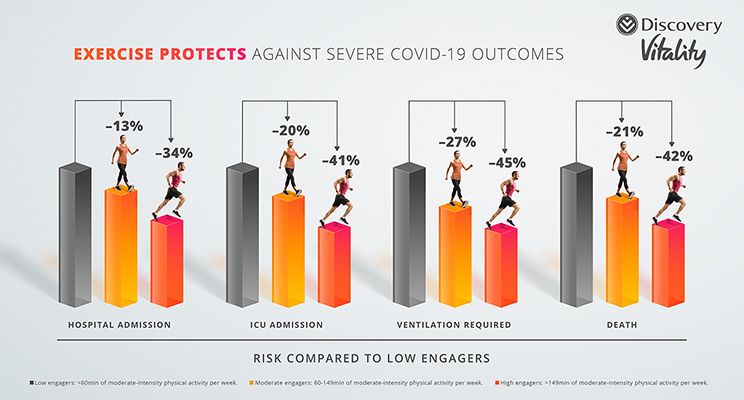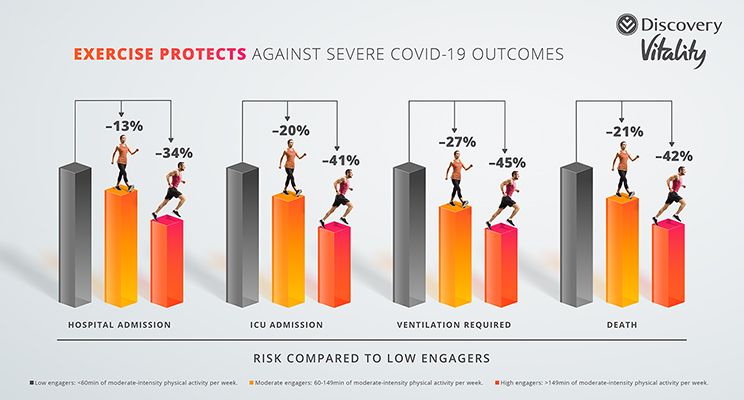
Press release -
Study: Regular exercise can prevent death from COVID-19 by up to 42%
10 February 2022, Johannesburg | New research from Discovery Vitality, produced in collaboration with Witwatersrand Sport and Health Research Group (WiSH) which has been published in the British Journal of Sports Medicine (BJSM), confirms that physical activity reduces severe COVID-19 outcomes.
"Small steps, strong shield" is the first study using objectively-measured physical activity data to demonstrate a positive association between physical exercise and protection against adverse outcomes from COVID-19. It underscores the positive effect of regular exercise on good health and in building immunity.
Wits’ Prof Jon Patricios, Vitality wellness clinician Deepak Patel and a team of Discovery actuaries led by Lizelle Steenkamp, analysed physical activity data linked to Vitality members infected with COVID-19. They found that both moderate and high levels of activity are associated with lower severity when contracting COVID-19. The study reveals a distinct advantage for those who are most active in protecting against severe COVID-19 outcomes, but there is also a clear benefit to engaging in even moderate levels of exercise, and a protective effect of activity for those with hypertension, diabetes and chronic renal failure.
Dr Mosima Mabunda, Head of Wellness at Vitality South Africa says: “We set out to determine if healthy behaviours associated with the Vitality programme, in particular physical activity, can reduce the risk of severe COVID-19 outcomes as measured by hospitalisation, admission to ICU, ventilation and death.”
The experience of 65 000 Vitality and Discovery Health members infected with the virus was matched against their levels of exercise in the two years prior to the March 2020 hard lockdown in South Africa. The health benefits of regular physical activity are well known, but this is the first time these insights have been drawn based on objectively-measured data (captured by smart devices, clocked gym attendance and participation in mass sporting events).
The impact of all levels of physical activity is profound
The physical activity engagement data was split into three categories, namely high engagers (150 minutes or more of moderate-intensity physical activity per week), moderate engagers (60 to 149 minutes of moderate-intensity physical activity per week) and low engagers (less than 60 minutes of moderate-intensity physical activity per week).
Those engaged in the highest levels of physical activity before the pandemic experienced 34% lower risk of hospital admission, 41% lower risk of ICU admission, 45% lower risk of requiring ventilation and 42% lower risk of death from COVID-19.
Even those patients engaged in moderate activity had a 13% lower risk of hospital admission, 20% lower risk of ICU admission, 27% lower risk of ventilation and 21% lower risk of death compared to the low-activity group.

While being elderly, male, or having hypertension or diabetes increases the likelihood of poor COVID-19 outcomes, exercising at high levels may have an even more significant effect on these more-at-risk groups, than in healthy people.
“As suspected, the benefit of regular physical activity showed a decrease in the incidence of negative outcomes – severe illness and death – in confirmed COVID-19 cases. When we think of the people behind these numbers, it translates into loved ones, colleagues and countless others saved in the world, by moving more,” says Mabunda.
The effects of reduced physical activity globally due to lockdowns
Dinesh Govender, CEO of Vitality SA, says: “Lockdown restrictions have understandably aimed to limit the pressure that large increases in COVID-19 cases impose on healthcare systems. But the unintended consequence of limiting movement has been the significant decrease in exercise levels seen during the pandemic, with subsequent implications for individual wellbeing.”
In the month immediately following the hard lockdown in South Africa, Vitality saw a 49% drop in members logging physical activity points compared to the 2019 baseline. Engagement in physical activity has, however, improved through successive waves of the pandemic as the lockdown restrictions eased.
“Our concern is that the decreases in physical activity levels seen may become entrenched for many around the world. It is clear, then, that we need to enhance our efforts to promote regular exercise as an adjunct to vaccination and other preventive measures, especially for those at high risk, and educate about the benefits of physical activity in the context of communicable diseases,” he says.
A simple way forward, not discounting other learnings
WHO modelling shows that 60% of deaths worldwide are attributed to four chronic conditions which are caused by four lifestyle habits: lack of physical activity, poor nutrition, smoking and alcohol abuse.
The science shows how regular exercise benefits the immune system by reducing inflammation, mobilising white blood cells to fight off infection, enhancing the body’s ability to recognise harmful pathogens (which cause disease) and importantly, improving psychological stress.
“Regular exercise has a known positive impact on both the public healthcare system as well as the individual and should therefore be encouraged at all times. In fact, this should be facilitated in both healthy people and those with co-morbidities – although this proved challenging in the current pandemic,” says Govender.
“We are likely to see future waves and pandemics in our lifetime. Now, we can take lessons learned during this pandemic to find innovative approaches to allow citizens to safely engage in physical activity, while still taking public health measures to secure the health and wellbeing of those around us,” he says.
Topics
Categories
Discovery information
About Discovery
Discovery Limited is a South African-founded financial services organisation that operates in the healthcare, life insurance, short-term insurance, savings and investment, and wellness markets. Since inception in 1992, Discovery has been guided by a clear core purpose – to make people healthier and to enhance and protect their lives. This has manifested in its globally recognised Vitality Shared-value Insurance model, active in over 35 markets with over 20 million members. The model is exported and scaled through the Global Vitality Network, an alliance of some of the largest insurers across key markets, including Asia-Pacific, Europe, North America and South America.
In 2021, Vitality Health International (VHI) introduced shared-value health insurance to employer groups operating in Ghana, Kenya, Nigeria, Democratic Republic of Congo (DRC) and Zambia, as well as Travel for Treatment service to the rest of Africa.
Discovery trades on the Johannesburg Securities Exchange as DSY. Discovery Group is the holding company of Vitality Group in the USA and of Vitality UK.
Follow us on Twitter @Discovery_SA











